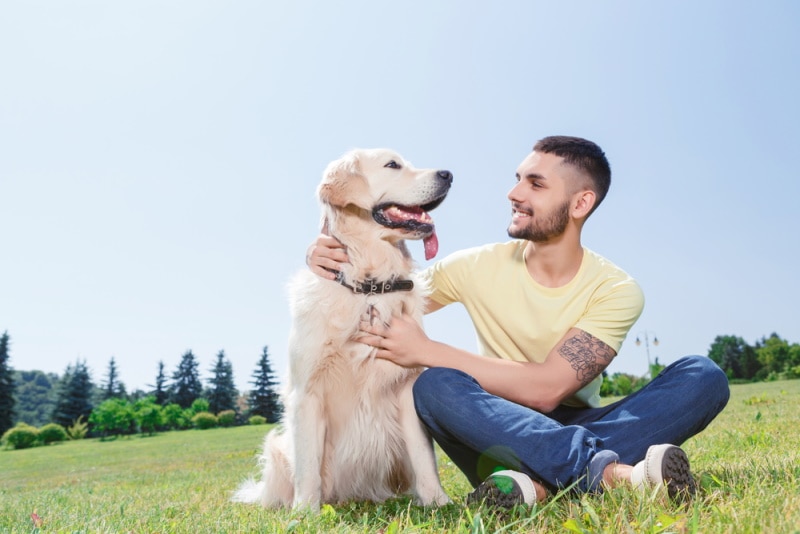Is a Dog Park Good for My Pup? Pros, Cons, Safety Tips & FAQ
By Hallie Roddy
Updated on

Click to Skip Ahead
With reports from the National Recreation and Park Association stating that 91% of Americans believe that dog parks benefit their communities, is it a surprise that you see so many pet parents hauling their pets to the closest dog park every morning, rain or shine1? In fact, dog parks are so popular that there has been a 40% increase in the development of them since 20092.
That said, does it mean that dog parks are safe for our beloved pooches? After all, there must be some cons of putting so many different breeds with so many different personalities in one place. You’d be right to think this way.
Dog parks are not good for all dogs, so it’s crucial to deeply consider if your furry friend is going to benefit from a trip to the local dog park or if it’s best to keep their daily exercise to outdoor, solitary walks and play sessions.
The 6 Things to Consider Before Taking Your Pup to the Dog Park
Before you ever take your dog to the park, you need to ensure that you’re making the most informed and best decision, not only for them but for you as well. It’s not as simple as walking into the park, unleashing your dog, and letting them play for an hour with other canines. There are a lot of things that might make it a not-so-safe place for both of you.
1. How Much Training Your Dog Has
Safety is the most important aspect of socialization between dogs, and truthfully, if your dog isn’t trained, then you are putting both them and other dogs at risk. At the very least, you need to know your dog will come when called the first time. Don’t forget that other dogs might not be trained properly either, so you’re always going to have to be supervising them while they play.
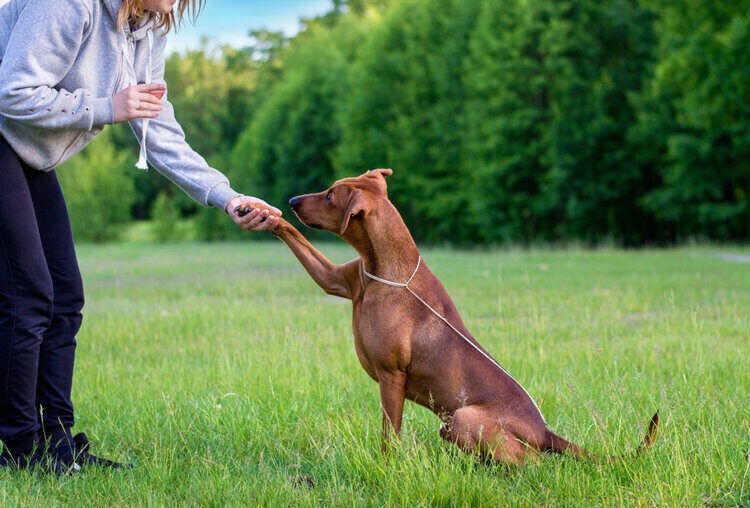
2. Your Dog’s Temperament and Personality
Dog parks are ideal for social butterflies—dogs who are confident, friendly, and won’t become fearful when another pup gets up in their business. On top of that, dogs that are already fearful or anxious may become even more so if they have a bad experience, thus ruining your chances of them ever enjoying the dog park in the future.
3. How Your Dog Plays
You need to be aware of what your dog’s play style is before you can even consider unleashing them around so many other dogs. If your pet loves running and roughhousing with their canine friends already, then the park is probably a good place for them. However, if they prefer to spend hours chasing a ball and aren’t prone to sharing, then it could lead to some issues.
4. The Construction of the Park
The ideal dog park is several acres big with lots of different terrain, structures, and solid fencing. It’ll also have a separate area for large and small dogs. However, as you probably already know, most dog parks are much smaller than this, and that means they are likely to be overcrowded. The less stimulating and the more crowded the park, the more likely it is that fights will break out. And, trust us, that could either be between dogs or between humans.
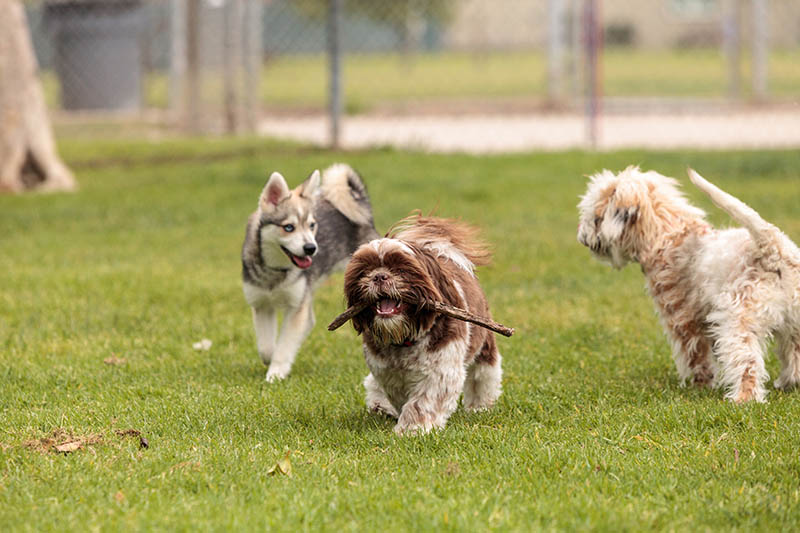
5. How the Park Is Managed and Maintained
The best dog parks are the ones with rules that are enforced. Public dog parks aren’t likely to have an attendant there to make sure the rules are being followed, but depending on the community, you might be meeting up with a bunch of rule followers that ensure everyone is adhering to them. Remember that this is for the safety of both the dogs and the pet owners.
On top of that, a poorly maintained dog park is just asking for trouble. If the fences aren’t maintained, the grass isn’t mowed, and poop isn’t picked up, then you’re better off finding another park in your area with better upkeep. Of course, we have to mention that it is your responsibility to pick up after your dog, but having plenty of waste bins available helps!
6. The Culture
This depends more on the humans that visit the park than the dogs. If owners aren’t paying attention to their pets and their activities, there is probably going to be some inappropriate behavior taking place. It’s best to surround yourself with like-minded pet owners that want the best not only for their own pets but for everyone else’s as well.
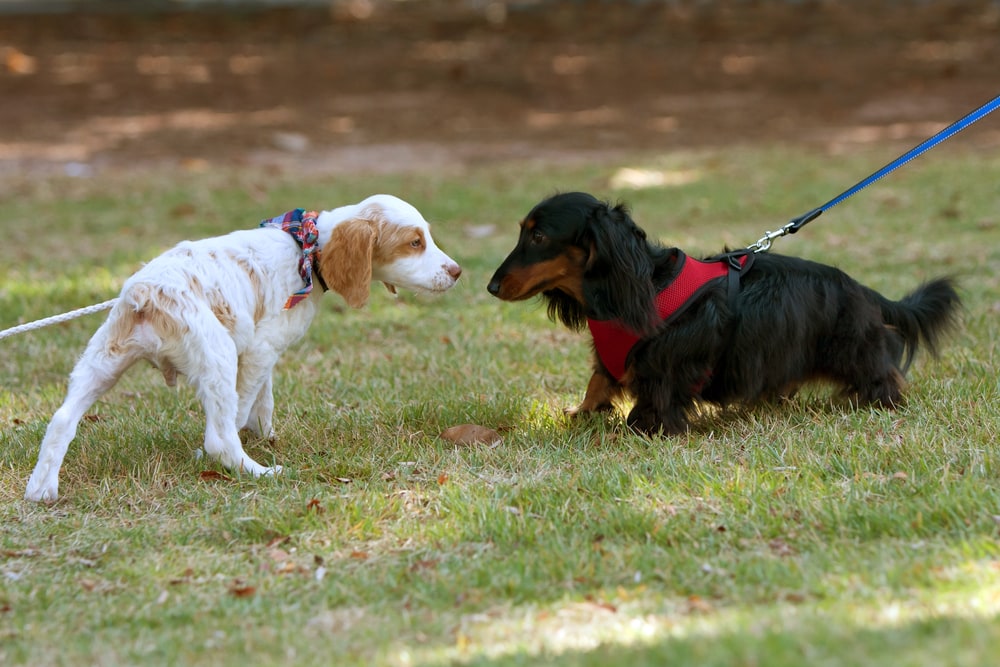
The Pros of Dog Parks
Clearly, dog parks can be a great way to give your dog some variety during the day or week. There are numerous benefits that can come with taking your pooch to a dog park.
Excellent Socialization Opportunities
It is crucial for dogs to be socialized from a young age—not only with other dogs but with other humans as well. What better place to get this training than somewhere that is surrounded by pets and their parents? Your pup can become accustomed to many different breeds and temperaments, all while becoming used to being around various types of humans. Better yet, well-trained and socialized dogs can educate your pet on social cues and body language that will come in handy once they’re older.
Plenty of Exercise
It’s no secret that dogs require daily exercise and mental stimulation. This is not only so that they stay in shape physically but to keep their minds from becoming bored and leading to behavioral issues that could become destructive. Cardio from all the running around will keep their lungs, heart, and muscles healthy, and their brains will stay active by being exposed to so many different smells, toys, terrains, and other dogs. It’s a win-win.
Please keep in mind that some breeds are far more likely to need to go to the dog park than others. For example, a small breed with minimal exercise requirements, like a French Bulldog, won’t need hours of movement like a hyper dog, such as a Husky, will. The dog park is, of course, open to all dogs (depending on the park), but that doesn’t necessarily mean that it’s a must-have for your pooch to live a healthy lifestyle. Simply put, some breeds benefit more than others.

It Benefits Humans Too
Dog parks aren’t just for canine socialization. With so many other pet lovers in one place, it’s a great opportunity to meet and talk to new people and socialize. Plus, you’ll be getting a bit more exercise yourself, whether it’s from the walk to the park or throwing your pup’s favorite ball until you feel like your arm is going to fall off.
 The Cons of Dog Parks
The Cons of Dog Parks
While you likely already know that there are many benefits of taking your dog to the park, you need to be aware that there are just as many disadvantages that you’ll want to consider. Your dog’s safety is always the top priority, so if you feel even a little bit uncomfortable taking them, it’s best to err on the side of caution.
Dog Parks Can Spread Disease and Parasites
Whenever there are a lot of dogs in one place, you can guarantee that the spread of parasites and disease is going to be more common. Some diseases spread through the air, while others spread through feces. And if you’ve got a dog that loves poop for some odd reason—smelling it, rolling in it, or even trying to eat it—then you definitely need to be extra careful.
- Canine distemper
- Kennel cough
- Canine influenza
- Parvovirus
- Worms (hookworms, tapeworms, roundworms)
- Fleas
- Ticks
- Giardia
Most of these are preventable with up-to-date vaccinations and monthly treatments, such as flea and tick medication. However, you also need to ensure you’re staying on top of these and are always monitoring your dog for any signs of illness.
Dog Fights and Injuries
Whenever you put multiple dogs in one area, there is always going to be a chance of fighting or injuries. Even if dogs aren’t in a full-out fight, roughhousing can get a little out of hand at times. This is even more common if there isn’t a place where small and large breeds can play separately.
If you’re unsure about how your pet behaves when around multiple other dogs, it’s not wise to let them off the leash right away. They need basic training and to be slowly introduced to other pets before they can roam freely.
In addition to this, remember that every dog’s temperament is different. Even if you’ve got the friendliest, most well-behaved dog at the park, you never know how someone else’s dog is going to react. This requires constant supervision on your end, and you have to know that you might get injured if you ever have to break up a fight. It’s a risk that comes with going to the dog park, and as you’ll see below, the rules clearly state that you’re responsible for assuming any risks that happen there.

Your Dog Might Pick Up Bad Habits
Just like how some humans can be a bad influence on you, some dogs can be a bad influence on your pup. You might notice that your dog is acting more fearful and anxious, or they might start ignoring your commands. Either way, this could mean it’s time to take a break from the park for a while.
 Common Dog Park Rules
Common Dog Park Rules
- Dogs must be licensed, vaccinated, collared, and microchipped.
- You must have a leash with you at all times.
- Owners are responsible for any injuries caused by aggressive dogs.
- Any dog showing aggressive behavior must leave the park immediately.
- No dogs in heat are allowed in the park unless on a leash at all times.
- Any sick or ill dogs (vomiting, diarrhea, etc.) should not come to the park.
- Children under 18 years old must be accompanied by an adult.
- Puppies under 6 months old are strongly discouraged from entering the park.
- All dog park users assume the risks related to the use of the park.

 Tips for a Safe Trip to the Dog Park
Tips for a Safe Trip to the Dog Park
- Visit the park without your dog first to ensure it is a good fit for them.
- Keep a close eye on your dog at all times and don’t let them wander.
- Ensure your dog is properly trained and comes when called.
- Puppies under 6 months of age should not go to the park until they are completely immunized.
- Keep large and small dogs separated.
- Keep on-leash and off-leash dogs separated.
- Don’t bring treats to the park.
- Return “stolen” toys.
- Bring lots of poo bags and always pick up after your pup.
- Do not bring females in heat to the park. Keep an eye on unneutered males.
- Children are strongly discouraged from going to the dog park, especially in off-leash areas.
- Don’t wear nice clothes—some dogs will try to mark you or your belongings as their territory. And if one dog pees on something, the rest will probably follow!

FAQs About Dog Parks
When Can My Dog Go to the Dog Park?
Every dog is different, so this is a complex question to answer. Dogs should never go to the park until they are up to date on all vaccinations and are put on medications for fleas, ticks, and worms. Only dogs with proper training should go to dog parks, although it is usually safe to keep dogs on a leash and in on-leash areas until you are confident in their training and social skills.
What Vaccination Does My Dog Need to Go to the Park?
You should always ask your veterinarian about what they recommend. In general, they will need vaccines for canine distemper, Bordetella, and rabies, along with flea and tick medications and dewormer.
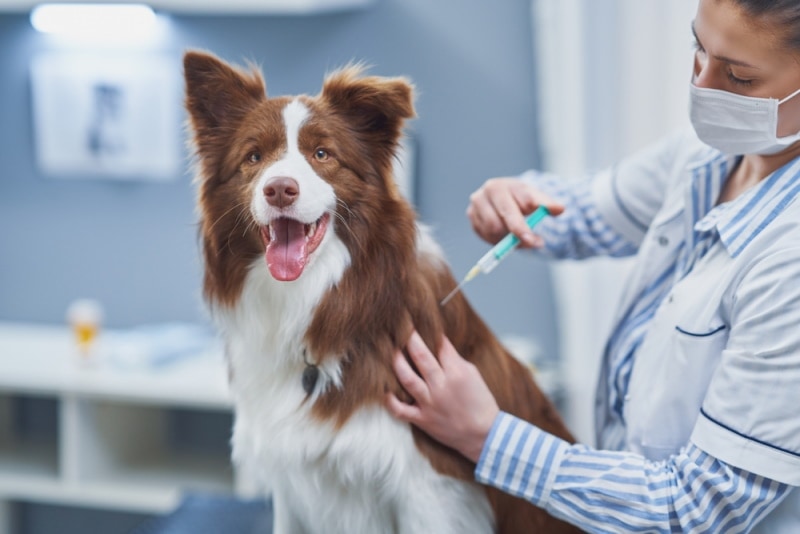
Can My Puppy Play With Large Dogs?
Every dog is different, so it’s hard to say. You probably shouldn’t let a young puppy play with big dogs in case the other dog is rough or aggressive. However, if there is a big dog that you’re confident in, then it’s probably okay. At the end of the day, you need to trust your gut and keep a very close eye on them while they interact.
Conclusion
While the dog park is definitely not a safe and beneficial place for all dogs, that doesn’t mean that it won’t be beneficial for yours. You need to do your homework before even taking your dog there and make a decision based on the information you’ve gathered. At the end of the day, it’s your call to determine whether or not your dog deserves a romp in the park or if they’re better off taking long, leashed walks with you alone.
Featured Image Credit: anetapics, Shutterstock






